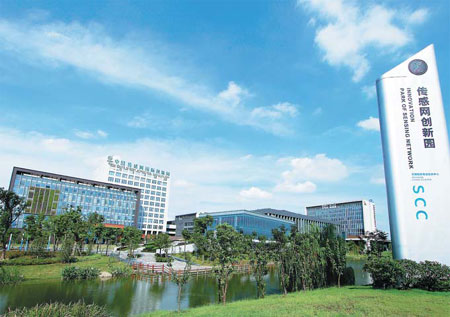An appealing option for haigui
Updated: 2013-05-20 07:22
By Mark Hughes and Lu Haoting in Wuxi (China Daily)
|
||||||||

|
Innovation Park of Sensing Network, which focuses on the development of the Internet logistics industry, is a high-tech incubator in Wuxi New District. Provided to China Daily |
Like any other creature, the sea turtle seeks out a good environment in which to raise its next generation.
Its pinyin name, haigui, has been adopted by the Chinese to describe people who have returned to the homeland after studying and gaining work experience abroad, attracted by what's now on offer in this developing nation in the face of declining economies abroad.
Many of them are finding Wuxi to be an appealing option, with its attractive environment, friendly policies and encouraging remuneration.
They have discovered Wuxi New District in the city's suburban area, about 120 kilometers west of Shanghai. Well-developed and diversified transportation systems make it easy to get access to both domestic and overseas markets. The new district was founded in 1992 as an industrial zone to attract large foreign companies and has now evolved to become one of the major industrial parks in China, featuring precision machinery and electronics. It attracted $14 billion in overseas investment in the past two decades.
"The quantity of the investments has been an important criteria for our job when attracting investors. But we now focus more on the quality of the investments," said Xu Gang, Party chief of the new district.
To be sure, the district is raising its threshold for attracting investment. It has pinpointed electronics, renewable energy, medical and healthcare, precision machinery and auto components manufacturing as its pillar industries - all considered highly attractive in today's economic environment. It will foster emerging industries including solar, "the Internet of Things", biomedicine, energy conservation and new materials. It also encourages companies to set up regional headquarters and R&D centers in the district. A project below $30 million in terms of investment and which does not fall into those categories, will be unlikely to get approval to set up in the district.
"Like many other regions in the country, Wuxi New District faces the same challenges such as limited resources, weak overseas demand for exports and sluggish profit growth of companies," Xu said.
"But a number of strategic and emerging industries, such as the Internet of Things, biomedicine and new materials, have shown stronger momentum for growth. And a number of advanced manufacturing projects are also ready for take-off. High-tech and modern service industries are emerging as the new driver for the economic growth of the area. That is a good sign for the transition from speed to quality-oriented growth," Xu added.
Typical of the companies attracted to Wuxi New District is Lanxess AG, a specialty chemicals group based in Germany. Lanxess established a wholly owned subsidiary in the new district in 1995 as a site for producing leather chemicals and engineering plastics for the Chinese market. The Wuxi site is now also a technology base, serving as home to the R&D center for leather treatment products in Asia-Pacific, R&D testing center for engineering plastics, and a microbiology test laboratory for material protection products.
Haigui Hu Dongqi, managing director of Lanxess (Wuxi) Chemicals Co Ltd, has seen an increase in fellow haigui returning to the area, which is famed for the excellence of its science students and works with universities to develop their talents.
Hu, born in 1961, was one of the first 100 students sent by the Chinese government to Germany for undergraduate studies in 1980, shortly after Deng Xiaoping's opening-up policies. He later became a post-doctorate research fellow at Standard University in California. He joined Bayer in 1993 and returned to Wuxi in 1997.
Lanxess achieved sales of more than 1 billion euros ($1.3 billion) on the Chinese mainland, Hong Kong, Taiwan and Macao last year.
Another Wuxi New District haigui is Stanley Duan, vice-president and region manager of East and Central China for Pactera Technology International Ltd, one of the largest China-based IT service companies, with 24,000 staff overall and more than 3,000 locally. He returned in 2006.
Duan left China, aged 19, two decades ago to study in Japan, majoring in civil engineering. At 26 he moved to the US "because it was bigger".
Now he sees China as even bigger and he can "understand the culture".
(China Daily 05/20/2013 page8)

 Michelle lays roses at site along Berlin Wall
Michelle lays roses at site along Berlin Wall
 Historic space lecture in Tiangong-1 commences
Historic space lecture in Tiangong-1 commences
 'Sopranos' Star James Gandolfini dead at 51
'Sopranos' Star James Gandolfini dead at 51
 UN: Number of refugees hits 18-year high
UN: Number of refugees hits 18-year high
 Slide: Jet exercises from aircraft carrier
Slide: Jet exercises from aircraft carrier
 Talks establish fishery hotline
Talks establish fishery hotline
 Foreign buyers eye Chinese drones
Foreign buyers eye Chinese drones
 UN chief hails China's peacekeepers
UN chief hails China's peacekeepers
Most Viewed
Editor's Picks

|

|

|

|

|

|
Today's Top News
Shenzhou X astronaut gives lecture today
US told to reassess duties on Chinese paper
Chinese seek greater share of satellite market
Russia rejects Obama's nuke cut proposal
US immigration bill sees Senate breakthrough
Brazilian cities revoke fare hikes
Moody's warns on China's local govt debt
Air quality in major cities drops in May
US Weekly

|

|








